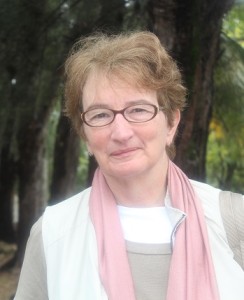AHA members are involved in all fields of history, with wide-ranging specializations, interests, and areas of employment.
To recognize our talented and eclectic membership, AHA Today features a regular AHA Member Spotlight series.
Ellen Griffith Spears is an assistant professor with a joint appointment at New College and the Department of American Studies at the University of Alabama. She lives in Tuscaloosa, Alabama, and has been a member since 2005.
Alma maters: BA, College of William and Mary; MA, PhD, Emory University
Fields of interest: Environmental history; critical regionalism, race, class, gender, and geography in the 19th- and 20th-century US South in a global context
When did you first develop an interest in history?
I have always been interested in history; my interest deepened during the decade that I worked at the Southern Regional Council, the Atlanta-based civil rights research institute, on the Voting Rights Review and Southern Changes, the organization’s quarterly journal.
What projects are you working on currently?
My new book, just published in Spring 2014 by the University of North Carolina Press, is Baptized in PCBs: Race, Pollution, and Justice in an All-American Town. The book focuses on the rise of southern industrialization, the impact of the synthetic chemical industry, and the militarization of the interior South through the lens of Anniston, Alabama. That city was important in the civil rights movement as the site of the firebombing of a Freedom Riders’ bus. My account leads from the town’s founding in 1872 as the “Model City of the New South” up through its 2002 designation as “Toxic Town USA,” as local environmental justice movements in the 1990s challenged toxic chemical pollution from PCBs (polychlorinated biphenyls) and from the US Army’s nearby chemical weapons storage facility.
Have your interests changed since graduate school? If so, how?
My interests have broadened since graduate school. I am currently working on a concise history of the US environmental movement post-1945. Also, as part of the University of Alabama’s Cuba Initiative, I have begun developing research collaborations with scholars at the University of Havana, work that is also expanding my scholarly interests in environmental sustainability as interpreted in diverse contexts.
Is there an article, book, movie, blog etc. that you could recommend to fellow AHA members?
I’m catching up on books I missed while working on my book manuscript. Right now I am reading Railroaded by environmental historian Richard White. The book is a model for how to do environmental history that exquisitely documents changing economic, technological, and social conditions, illuminating how “history shows us that things need not be the way they are.”
What do you value most about the history profession?
Collegial relationships formed through research, teaching, and public history collaborations and nurtured through professional organizations have been so important to my scholarly work.
Why did you join the AHA?
Meeting with other historians and understanding the latest developments both in my own fields of interest and in historiography more broadly have drawn me to AHA meetings. I also enjoy learning about the history of the various cities in which we have met.
Do you have a favorite AHA annual meeting anecdote you would like to share?
New York City for New Year’s in 2009, on “Globalizing Historiography,” was a memorable meeting.
Other than history, what are you passionate about?
Photography and travel in the US and internationally have been important to me both for personal enjoyment and professional growth. I teach an urban ecology history course titled “Urban Spaces,” so bringing home photographs and fresh insights about cities enlivens my teaching as well. When I visited Stockholm while conducting the interviews for Baptized in PCBs, for example, I was pleased to learn more about the history of advances by the European Union in regulating toxic chemicals. I could see firsthand environmentally sustainable innovations that could be implemented in the US, if the political will could be mustered.
This post first appeared on AHA Today.
Tags: AHA Today Member News Member Spotlight Environmental History Urban History
Comment
Please read our commenting and letters policy before submitting.






